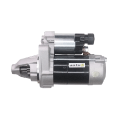Verified Reviews - Mobile Mechanic Near Me
Nicole Frost
Verified
Great service. They come right to your home and fix your car. It saved me money than having to have it towed to the shop. Very professional and keep me updated the whole way. Thank you for the great service. Highly recommend.
Gregory Conran
Verified
I used Instant Car Fix to replace a like part on car that had previously been damaged. They were fast, efficient, easy to schedule, and I highly recommend. I plan on using their services again for upcoming car maintenance/repair services.
Lisa Edwards
Verified
Jose' was very professional, Knowledgeable and nice! He put in a new starter in my car and it is fixed and running. Great service! Easy to navigate the website and place and order for what you need and also pick your own date and time for the mechanic to come. I will definitely use them again!
Cindy Cain
Verified
My experience was great. Sergio not only arrived the same day I booked-he did a great job bc he pointed out another issue and didn't push to service, just inform. Who needs a shop mechanic? Not me. I will stick with Instant Car Fix-5 stars.
Jodi Just
Verified
I don't even know where to start! We were 6 hours away from home at an AirBnB in Nokesville VA. It was 3/31, on Easter Sunday, and our starter went out. My first quote was RIDUCULOUS! I contacted Instant Car Fix and their quote was ALMOST HALF! I sent the company a video and they automatically knew that the starter was the problem. Walter arrived before the expected time and was able to fix our 2008 Nissan Titan within 4 hours (the first stater that was bought was bad, and he had to get another, which wasn't his fault.) Our truck was fixed and we were on the road home. Walter was so very nice and knowledgeable. I can't thank the whole crew at Instant Car Fix enough for getting us back on the road to home in Tennessee. I would HIGHLY recommend them for any of your needs!
Nicole Frost
Verified
Great service. They come right to your home and fix your car. It saved me money than having to have it towed to the shop. Very professional and keep me updated the whole way. Thank you for the great service. Highly recommend.
Gregory Conran
Verified
I used Instant Car Fix to replace a like part on car that had previously been damaged. They were fast, efficient, easy to schedule, and I highly recommend. I plan on using their services again for upcoming car maintenance/repair services.
Lisa Edwards
Verified
Jose' was very professional, Knowledgeable and nice! He put in a new starter in my car and it is fixed and running. Great service! Easy to navigate the website and place and order for what you need and also pick your own date and time for the mechanic to come. I will definitely use them again!
Cindy Cain
Verified
My experience was great. Sergio not only arrived the same day I booked-he did a great job bc he pointed out another issue and didn't push to service, just inform. Who needs a shop mechanic? Not me. I will stick with Instant Car Fix-5 stars.
Jodi Just
Verified
I don't even know where to start! We were 6 hours away from home at an AirBnB in Nokesville VA. It was 3/31, on Easter Sunday, and our starter went out. My first quote was RIDUCULOUS! I contacted Instant Car Fix and their quote was ALMOST HALF! I sent the company a video and they automatically knew that the starter was the problem. Walter arrived before the expected time and was able to fix our 2008 Nissan Titan within 4 hours (the first stater that was bought was bad, and he had to get another, which wasn't his fault.) Our truck was fixed and we were on the road home. Walter was so very nice and knowledgeable. I can't thank the whole crew at Instant Car Fix enough for getting us back on the road to home in Tennessee. I would HIGHLY recommend them for any of your needs!
Nicole Frost
Verified
Great service. They come right to your home and fix your car. It saved me money than having to have it towed to the shop. Very professional and keep me updated the whole way. Thank you for the great service. Highly recommend.































